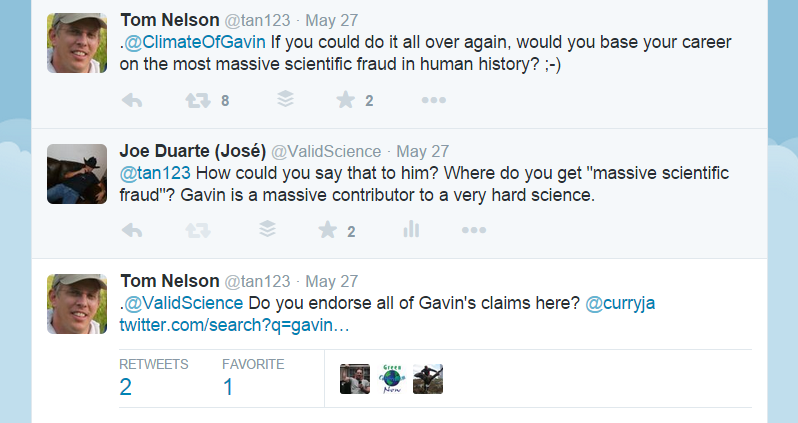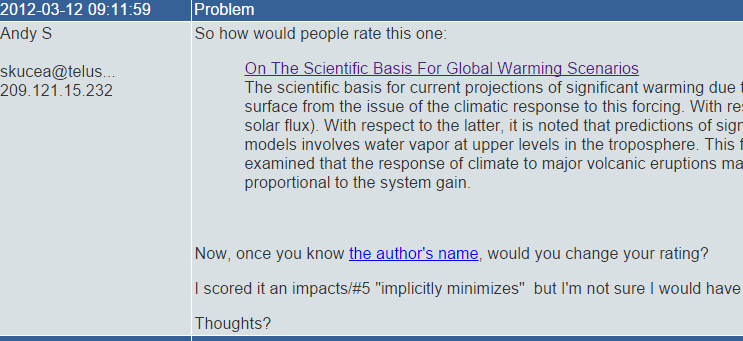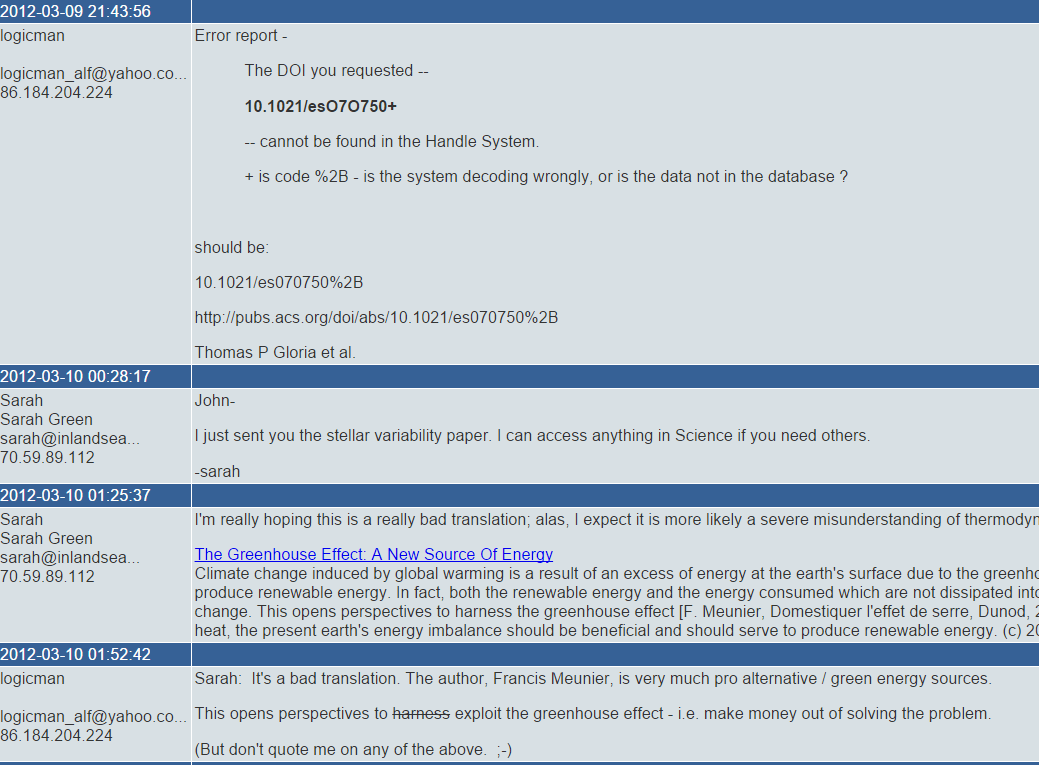|
A few days ago on Twitter I said that climate skeptics needed to distance themselves from the conspiracy theorists and harassers. This upset a dozen or so climate skeptics and led to a flurry of rebukes that I had trouble following due to their sheer volume and the constraints of a 140-character medium. I can't coherently respond or clarify my thoughts on Twitter itself, so I'll do so here. Since joining Twitter, I've posted variously on science, social science, climate science, statistical methods, fraud cases, interesting articles in the Atlantic or New Yorker, and the catch that was definitely a catch. Most of my tweets (oh God) on climate issues over this period would have been more satisfying for climate skeptics than environmentalists. The Cook 97% fraud case has been a popular issue with skeptics, and understandably so. The climate science consensus has been systematically overestimated by untrained researchers, fraud, invalid methods, failure of peer review, and an ancient enemy of science that I will elaborate upon in upcoming peer-reviewed literature. I've occasionally reminded people that I'm not a climate skeptic, and I try to cleanly separate climate science from estimates of the consensus from policy issues and so on. These are all very different things to me. Because I've called out the Cook fraud, people seem to have sorted me into the skeptic camp, including skeptics themselves. That's a mistake. My perceived scolding of skeptics was prompted by this:  I know of no body of evidence that would lead a reasonable person to conclude that climate science is the most massive scientific fraud in history. This whole conspiracy issue has come up a lot recently as a potential personality disposition. I think it's worth lingering on what would have to be true for the science of human-caused climate change to be a massive fraud. First, a lot of people would have to be in on it, virtually all climate scientists that work on the issue and the boundaries of the issue. I think for that to be true would in turn require both an unrealistic model of human psychology and an unrealistic model of how science works. If it were a fraud, one ethical and capable climate scientist could blow it open. Even a capable outsider like Steve McIntyre could blow it open. What do I mean? If CO2 doesn't cause warming, or if the true value of ECS was 0.1 °C or something, and the field was hiding this fact, this would be discoverable. Someone could report their analyses revealing the truth. Assume that they couldn't get into journals because the field is a fraud and they censor any off-message findings. They could post it online. Most people wouldn't believe it at first, would do the whole source/peer-review harrumphing. But it would certainly circulate among climate skeptics and eventually climate scientists would have to confront it. Republicans in Congress would start asking them about it and so on. Has that happened? Not to my knowledge. Where is there a finding or analysis that debunks the AGW hypothesis? Instead, all we see are lower estimates of human forcing, ECS, model quality, etc. When Judith Curry argues against climate science orthodoxy and overconfidence, she's not saying it's all false. Her scientific work offers lower estimates of ECS, for example (Lewis and Curry, 2014). Steve McIntyre has never argued that the hypothesis is false, or offered any debunking of it. His work has been focused on specific issues with specific papers and methods. If it were all a hoax, I think McIntyre would have been both inclined and able to expose it some years ago. If this is about disagreeing with the magnitude or confidence of prevailing climate science estimates, for example where they project a 3 or 4 °C warming and you think it's 1 or 2 °C, then that's not a fraud issue. That's disagreement. You can argue bias, tribalism, or political ideology as factors driving their estimates, but that's a long way from fraud. Fraud is willful deception. My vehemence against the fraud cases I discovered should not be confused for a loose definition of fraud. When I say "the Cook fraud", I mean concrete acts of fraud, like claiming this: When they did this: They lied. The ratings were not independent. They asked each other for feedback on their ratings, undermining both the validity of the ratings and the ability to compute rater reliability. Authors and journal identities were not hidden, which was essential for a subjective rating study – they were freely disclosed. They routinely broke researcher blindness, and routinely outed scientists who were friendly or hostile to their cause, sometimes even by "smell". In fact, the entire papers were freely distributed, shattering any notions of blindness. The first author himself broke protocol and blindness, identifying the authors of papers. And they all worked at home, so they could pull up the whole paper and break blindness anytime they wanted. We would panic if researchers broke blindness in a biomedical study – e.g. the person handing out placebo or treatment pills to patients. If the researchers in a double-blind study knew what condition the patient was in, what kind of pill or other treatment they were giving them, it could affect the study. They might interact differently with patients if they knew their condition, and those differences could have downstream consequences, like for example the patient inferring what group they were in from the researcher's confidence or other cues. Or something about the researcher's administration of more complex treatments could change were blindness broken. In any case, if a biomedical study claimed that the researchers were blind, and it turned out they weren't, that study would be retracted in a heartbeat. Everyone would get it. This is much worse. This is a subjective rating study where the researchers read textual material and made complex inferences from it. Given the nature of the topic, blindness to author and journal was critical, as would be the procurement of qualified neutral raters situated in a controlled environment on campus, not activists working from home. Breaking blindness in this kind of study is much more serious than for a pill handler. And lying about researcher blindness is the crux of the fraud issue in both cases. That's what fraud is. They knew they had this forum where they routinely broke independence and blindness, yet claimed their ratings were independent and blind. Show me that kind of fraud in climate science, and then we'll talk. Bias isn't fraud. Disagreement isn't fraud. Lying is fraud, but you can't just assume that people who disagree with you are lying. People on Twitter complained that I had called out skeptics unfairly, that climate activists or scientists behave worse. I don't like that kind of blame shifting. First, we have to keep in mind that human communication operates under lots of constraints. It's sequential and somewhat discrete. We can usually only say one thing at a time. This is especially true on Twitter. It's not reasonable to expect that when I criticize skeptics I'm also going to put it in context by criticizing environmentalists. Grown-ups should be moderately tough and resilient. Ethically, we should be open to criticism of our groups, our friends, ourselves. We know, a priori, that some of that criticism will be true (over the course of a human life.) There are features of human language that shape the ways we communicate on these and other issues. The content of present communication is usually much more salient than past communication, past experiences, knowledge of a person's character, etc. And that's just one class of constraints. For the last two years, I've thought about how we could create new languages that would enable humans to communicate classes of concepts that are difficult or impossible with current languages, as well as overcome some of the temporal and salience issues. Linguistics, constructed languages, and human concept-formation and reasoning are deeply interesting topics. Eventually I think we'll have better ways of communicating, including constructed languages, but that's a very long-arc projection (50 - 200 years). It's useful to step back and consider the constraints in how we communicate with each other. That's a tangent, but some of these constraints impact our increased political polarization. Another tangent: It's fun to think about less ambitious ways to improve communication, like evolutions of Wolfram Alpha's Computable Document Format.
18 Comments
Barry Woods
6/1/2015 07:27:46 pm
Tom Nelson is an individual, he represents no one but himself, and how much of Tom tweets are rhetoric, rather than a belief in actual 'fraud'
Reply
Rob
6/5/2015 01:19:40 am
Yes, there is no way around it: on its own website NASA is treating the fraudulent studies as if they were reliable sources for the claim of 97% consensus. If that is not evidence that NASA itself is engaged in fraud, I don't know what could possibly be.
Reply
1/8/2016 09:14:04 pm
For amusement, look at the construction NASA has to resort to: "studies published in peer-reviewed scientific journals."
Reply
tlitb1
6/1/2015 08:03:01 pm
I personally agree about the uselessness of throwing out the the "scientific fraud" trope. However with the clear upper hand the consensus side has in media, academia, and politics, taken with the distribution of harassers and conspiracy theorists surely being about the same on both sides, my personal feelings about your request is that it was plainly silly, a bit like asking all skeptics to somehow independently become taller than the alarmists!
Reply
6/1/2015 08:13:25 pm
I have a few things to say about this, which I will say in separate comments. I will start by agreeing with you. It's true that both sides of the climate debate have people on their side who overstate the case. For example saying that climate science is all a fraud, or saying that climate sceptics are all in the pay of the Koch brothers.
Reply
BDAABAT
6/2/2015 01:07:19 am
Jose: It sort of depends... what is your definition fraud?
Reply
Shadeburst
6/27/2015 03:03:13 pm
Richard A. Muller says that Climategate shows scientific malpractice on a massive scale, and Muller's a warmist.
Reply
Dr. Jay Cadbury, phd.
6/2/2015 02:45:46 am
I really think Jose is simply not aware of some of the more egregious transgressions committed by the alarmists. Chris Mooney just yesterday quoted Jeff Masters as saying current temperatures are the hottest ever. He didn't say hottest in the instrumental record, he said hottest ever. That is irresponsible and fraudulent as a meteorologist to say that, and when it goes uncorrected, science loses.
Reply
I am curious how one would "disprove" global warming caused by humans. Before one can say that no one has yet disproved the theory, one should be defining what is required to disprove it. There does not seem to be any way to actually disprove the theory. Can anyone clarify this? (As an aside, defining that theory is also problematic. I have had numerous exchanges with persons who define global warming very differently from one another.)
Reply
John M
6/2/2015 12:18:42 pm
"Show me that kind of fraud in climate science, and then we'll talk. Bias isn't fraud. Disagreement isn't fraud. Lying is fraud, but you can't just assume that people who disagree with you are lying."
Reply
Mike S
6/2/2015 02:43:56 pm
Tom Nelson should be thanking you, not attacking you.
Reply
Nick Milner
6/2/2015 09:35:04 pm
FWIW I agree with José. Although I consider myself a sceptic I don't believe a for a moment that prominent climate scientists are perpetrating a deliberate fraud. Being wrong is not a crime.
Reply
Sheri
6/3/2015 12:38:59 am
Agreed, Nick. I have never really believed in true secretive or widely organized conspiracies—people are too hard to keep in line. In global warming, there's the problem of now that things have grown politically and career wise based on the idea that man is destroying the planet, how do you go back? You can't just say "Oops, I was wrong". Backing off can get you ostracized, as many well know. Politicians are vilified if they don't go along. It just grew and grew and now there's no backing off. If one gets a result that might go against the consensus, the average person would go back and try to find out why they were "wrong", rather than right, because being right just has too much at stake. They're just stuck now.
Reply
MikeR
6/4/2015 01:12:00 am
It's obvious to most of us that climate science is not a fraud. That doesn't mean that individual climate scientists can't be frauds, of course. A lot of the hockey stick debate (Hide The Decline comes to mind) seems pretty close to it to me. I remember an interview where Richard Muller basically said as much: they showed a graph multiple times, over several years, where contrary data was was trunctated, and that truncated curve hidden behind the others.
Reply
MikeR
6/4/2015 06:56:46 am
Not on topic.
Reply
Nick Milner
6/4/2015 09:25:34 am
I came to say the same thing; maybe Karl et al. 2015 would be a good paper for someone like Jose to take a close look at.
Reply
Bdaabat
6/4/2015 10:32:48 pm
Clipped from Brandon Shollenberger's site: sums up my feelings about this issue nicely.
Reply
1/8/2016 09:34:49 pm
Jose,
Reply
Leave a Reply. |
José L. DuarteSocial Psychology, Scientific Validity, and Research Methods. Archives
February 2019
Categories |






 RSS Feed
RSS Feed